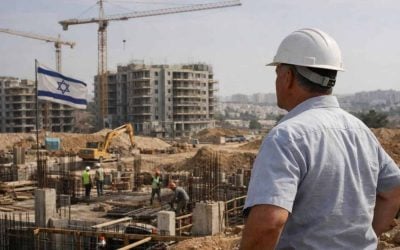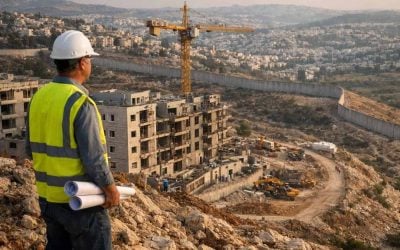Market Sentiment Remains Steady
Israel’s real estate sector continues to show remarkable resilience, even after a period of conflict and economic strains. Early indicators in 2025 point to a stable housing market, with overall buyer interest staying relatively strong. Despite the challenges posed by recent events, many analysts predict that demand for residential properties will remain buoyant, especially in major cities.
Rising Interest from Overseas Buyers
A notable source of ongoing demand comes from Jewish communities abroad and other foreign investors. The desire for a second home in Israel—often Viewed as both an emotional investment and a safeguard—is on the rise. Mortgage data suggests that foreign residents have been increasingly active in seeking financing for property purchases. Analysts connect this pattern to heightened concerns about global anti-Jewish sentiment, prompting more overSeas buyers to consider Israel a secure long-term option.
Fluctuating Mortgage Volumes
One of the most intriguing developments in the curRent cycle is the dip in domestic mortgage activity. January 2025 saw a lower volume of new loans compared to the end of the previous year, suggesting either a temporary cooldown or a seasonal pause. Observers are watching closely to see if borrowing rebounds in the coming months—a trend that could influence overall property transaction levels.
Continued Rise in Home Prices and Rents
Home prices in Israel keep climbing. The latest data indicates a monthly gain of around 0.6%, with Prices now standing nearly 8% higher than the same period last year. Tel Aviv remains the most expensive hub, with average home costs hovering at around ₪4.1 million (approximately $1.15 million). Jerusalem and Netanya average closer to ₪2.8 million, offering more moderate price points.
Renters are also feeling the effects. New lease contracts typically reflect about a 4% increase compared to what previous occupants paid, contributing to a roughly 3% uptick in the nation’s rental index over the last year. These rising costs underscore ongoing concerns about overall affordability.
New Construction and Commercial Projects
Amid this robust market, several high-profile developments and commercial ventures are moving forward:
- Government settlement plans include nearly 1,000 new residential units in the West Bank, stirring debates about expansion in disputed territories.
- On the commercial side, major logistics and data center projects are underway. A large logistics facility covering roughly 25,000 m² is set for construction in Ashdod, while a major data center development is planned in Shoham, reflecting renewed corporate confidence in the industrial and tech sectors.
Evolving Government Policies
Recent tax and regulatory changes continue to shape the market:
- A 1% increase in Israel’s VAT (now at 18%) has slightly raised purchase costs for new properties.
- In a bid to stimulate activity, the government has proposed a 2% reduction in purchase tax for certain homebuyers, along with tax incentives for developers investing in peripheral areas.
- In Jerusalem, property tax (Arnona) has seen a sharp hike, with reclassifications leaving some homeowners facing as much as a 30% jump in their yearly bills. Protests have emerged among residents who feel the increases are disproportionately burdensome.
Meanwhile, a revised Consumer Price Index now places even more weight on housing expenses, meaning that future shifts in rent and home prices will have a stronger impact on overall inflation measurements.
Large-Scale Transactions
Despite occasional market dips, investment in commercial real estate and industrial assets remains brisk. In Ashdod, Sizeable plots and industrial complexes have changed hands for tens or even hundreds of millions of shekels. These high-value deals highlight ongoing investor confidence—both domestic and foreign—in the potential of Israel’s real estate sector to deliver stable, long-term returns.
Social Tensions and Global Awareness
Heightened political sensitivities have spilled over into property fairs and expos abroad. A recent real estate event in Brooklyn drew protests, reflecting broader global debates about land rights and Israel’s regional policies. While these demonstrations momentarily disrupted the expo, they also underscored the international spotlight on Israeli real estate, which continues to attract a strong cohort of foreign buyers and investors.
Boost in Tax Revenues
The government is seeing record-breaking revenues from real estate transactions. January’s tax intake from property-related levies jumped around 30% compared to the same period last year, a sign of continued robust market activity. This boost offers a fiscal cushion for government expenditures, though it also raises questions about whether persistent price growth could outpace wage increases and limit affordability for average Israeli households.
Looking Ahead
Israel’s real estate market maintains a delicate balance between strong investor sentiment, rising prices, and the ever-present challenge of affordability. While mortgage volume fluctuations and looming tax changes will shape buyer behavior, long-term prospects appear positive. Commercial developments—especially in logistics and technology—reflect confidence in future growth. However, the pace of price increases and emerging social tensions remind industry participants to stay mindful of evolving economic and political factors.
Overall, observers expect the Israeli property sector to remain dynamic throughout 2025, driven by a mix of domestic household formation, resilient investor confidence, and continued interest from abroad. For both buyers and sellers, the coming months will be a critical period to watch as new policies and global conditions influence an already fast-moving marketplace.




